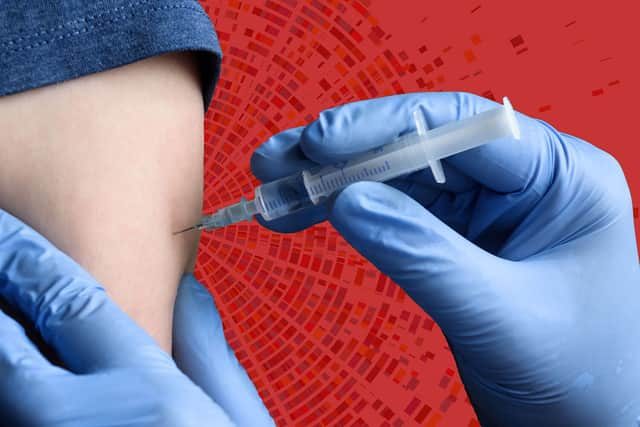Covid vaccine: which gene helps with antibody response and increases immunity after the Covid jab?
and live on Freeview channel 276
Scientists from the University of Oxford have identified a gene associated with strong immune response following Covid-19 vaccination. But what is the gene and what does it mean? Here’s what you need to know.
What gene is associated with a strong immune response after a Covid jab?
Researchers found that people who carry a version of a human leukocyte antigen (HLA) gene known as HLA-DQB1*06 are more likely to generate a higher antibody response after getting their jab than those who do not.
Advertisement
Hide AdAdvertisement
Hide AdThe human leukocyte antigen (HLA) system is an important part of the immune system.


Experts said the effect was seen in both Pfizer/BioNTech as well as Oxford/AstraZeneca vaccines.
The team analysed DNA samples from 1,190 participants enrolled in the University of Oxford’s vaccine clinical trials, as well as from 1,677 adults who had enrolled on the Com-COV research programme.
They also looked at samples from children who had participated in clinical trials for the AstraZeneca vaccine.
Advertisement
Hide AdAdvertisement
Hide AdResearchers found that individuals carrying the HLA-DQB1*06 gene recorded higher antibody responses against the Covid-19 vaccines at 28 days following the first dose.
Participants who had the gene were also found to be less likely to experience breakthrough infection, which is where people still get infected with Covid despite being vaccinated.
Around 30-40% of people in the UK are thought to carry the HLA-DQB1*06 gene.
The team said their findings, published in the journal Nature Medicine, could improve vaccines and help prevent infection in the future.
Advertisement
Hide AdAdvertisement
Hide AdDr Alexander Mentzer, NIHR academic clinical lecturer at the Wellcome Centre for Human Genetics and a lead researcher on the study, said: “We have seen a wide variation in how quickly people test positive for Covid-19 after vaccination.
“Our findings suggest that our genetic code may influence how likely this is to happen over time.
“We hope that our findings will help us improve vaccines for the future so they not only stop us developing severe disease, but also keep us symptom-free for as long as possible.”
Julian Knight, professor of genomic medicine at the University’s Wellcome Centre for Human Genetics and chief investigator on the study, said: “Further work is needed to better understand the clinical significance of this specific association, and more broadly what identifying this gene variant can tell us about how effective immune responses are generated and ways to continue to improve vaccines for everyone.”
Which vaccines are being used in the autumn Covid booster programme?
Advertisement
Hide AdAdvertisement
Hide AdThe rollout of the autumn Covid booster jab is now well underway, with people across the UK invited to receive a jab depending on their eligibility.
These are the vaccines being used in the programme:
Advised for use in adults aged 18 years and above:
- Moderna mRNA (Spikevax) bivalent Original ‘wild-type’/Omicron BA.1. Dose: 50 micrograms
- Moderna mRNA (Spikevax) Original ‘wild-type’ vaccine. Dose: 50 micrograms
- Pfizer-BioNTech mRNA (Comirnaty) bivalent Original ‘wild-type’/Omicron BA.1 vaccine. Dose: 30 micrograms
- Pfizer-BioNTech mRNA (Comirnaty) ‘wild-type’ vaccine. Dose: 30 micrograms
Advised for use in persons aged 12 to 17 years:
- Pfizer-BioNTech mRNA (Comirnaty) bivalent Original ‘wild-type’/Omicron BA.1 vaccine. Dose: 30 micrograms
- Pfizer-BioNTech mRNA (Comirnaty) ‘wild-type’ vaccine. Dose: 30 micrograms
Advised for use in persons aged 5 to 11 years:
- Pfizer-BioNTech mRNA (Comirnaty) ‘wild-type’ vaccine paediatric formulation. Dose 10 micrograms.
Exceptional circumstances:
Novavax Matrix-M adjuvanted wild-type vaccine (Nuvaxovid), dose 5 micrograms, may be used ‘off-label’ as a booster dose for persons aged 18 years and above when no alternative clinically suitable UK-approved COVID-19 vaccine is available.
Comment Guidelines
National World encourages reader discussion on our stories. User feedback, insights and back-and-forth exchanges add a rich layer of context to reporting. Please review our Community Guidelines before commenting.
